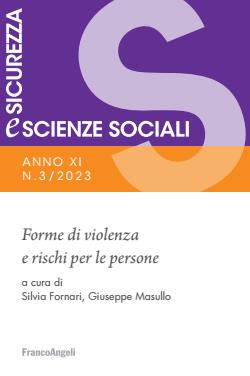Issue 3/2024 The power of stigmatization and de-stigmatization in urban contexts. Theoretical debate and practices
- Eleonora Clerici, Giuseppe Ricotta, Preface
- A cura della Redazione, Appendice bio-bibliografica delle autrici e degli autori
Articoli
- Eleonora Clerici, Giuseppe Ricotta, Territorial stigmatization and destigmatization as analytical concepts to frame and comprehend urban inequality and abyssal exclusion (Stigmatizzazione e destigmatizzazione territoriale come concetti analitici per inquadrare e comprendere la disuguaglianza urbana e l’esclusione abissale)
- Eduardo Ramos, Isadora Vianna Sento-Sé, “Pacification” of Favelas in Rio de Janeiro: The Case of UPPs (“Pacificazione” delle Favelas a Rio de Janeiro: Il Caso delle UPP)
- Ilaria Meli, Analisi di un processo di stigmatizzazione. Uno studio di comunità a Nuova Ostia (Analysis of a stigmatisation process. A community study in Nuova Ostia)
- Paolo Do, Letteria Lia Fassari, Gioia Pompili, Anna Maria Paola Toti, Crossing stigmatizing spaces of homelessness and mental distress
- Denise Contessa, Un margine che (non) vuole diventare centro. Dalle narrazioni ufficiali sull’immagine della città alle resistenze locali: il caso della Bolognina (A margin that does(n’t) want to become a center. From city’s image official narratives to local resistance: the case of Bolognina)
- Francesco Calicchia, Maria Elena Capuano, La stigmatizzazione territoriale veicolata dai media e le strategie di resistenza collettiva. Il caso del Rione Sanità (The territorial stigmatisation conveyed by the media and the strategies of collective resistance. The case of the Rione Sanità)
- Gianfranco Zucca, Riccardo Carbone, Wanted but not welcome. Stigma territoriale e società civile organizzata a Tor Bella Monaca, Roma (Wanted but not welcome. Territorial stigma and civil society in Tor Bella Monaca, Rome)
- Laura Squillace, Roberto Cornelli, Ignacio Cano, Fear and surveillance on the beaches of Rio de Janeiro: the Operação Verão
- Francesca Bitetto, Il potere dell’ascolto, la direzione dello sguardo per decostruire la stigmatizzazione urbana (The power of listening, the direction of the gaze to deconstruct urban stigmatization)
- Daria Forlenza, Folco Cimagalli, Processi di marginalizzazione: il caso delle temporeras in Andalusia (Processes of marginalisation: the case of temporeras in Andalusia)
- Maria Grazia Galantino, Francesca Messineo, Produzione, adattamento e resistenza allo stigma territoriale nel quartiere romano Quarticciolo (Production, adaptation, and resistance to territorial stigma in the Roman neighbourhood Quarticciolo)
